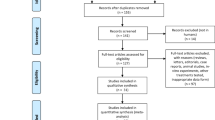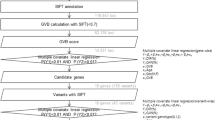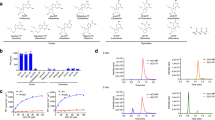Abstract
Mycophenolic acid (MPA) is a selective inhibitor of inosine 5′-monophosphate dehydrogenase (IMPDH), the rate-limiting enzyme of de novo synthesis of guanine nucleotides. The isoenzyme IMPDH2 predominates in activated lymphocytes, and its inhibition by MPA is part of standard immunosuppressive regimens. Yet, there are significant unexplained differences in efficacy and tolerability among patients. The objective of this study was to analyze whether frequent variants in the IMPDH2 gene lead to changes in IMPDH activity and to differences in responsiveness to MPA therapy. All 14 exons and intron–exon boundary regions of IMPDH2 were sequenced from genomic DNA probes from 100 healthy individuals. Two novel exonic single-nucleotide polymorphisms were identified in 1% and one intronic polymorphism (rs11706052) in 19% of the study population. Lymphocyte IMPDH activity and proliferation under three MPA concentrations (2.5, 10 and 25 μmol l–1) were compared in rs11706052 carriers and wild-type individuals. The presence of rs11706052 polymorphism reduced the antiproliferative effect of MPA on lymphocytes by approximately 50% compared with the IMPDH2 wild-type form at therapeutic relevant concentrations of 10 μmol l–1 and 25 μmol l–1. We conclude that a poorer response to MPA therapy can be explained in some individuals by the presence of the rs11706052 polymorphism.
This is a preview of subscription content, access via your institution
Access options
Subscribe to this journal
Receive 6 print issues and online access
$259.00 per year
only $43.17 per issue
Buy this article
- Purchase on Springer Link
- Instant access to full article PDF
Prices may be subject to local taxes which are calculated during checkout

Similar content being viewed by others
References
Zimmermann AG, Gu JJ, Laliberte J, Mitchell BS . Inosine-5′-monophosphate dehydrogenase: regulation of expression and role in cellular proliferation and T lymphocyte activation. Prog Nucleic Acid Res Mol Biol 1998; 61: 181–209.
Allison AC . Mechanisms of action of mycophenolate mofetil. Lupus 2005; 14 (Suppl 1): 2–8.
Allison AC, Eugui EM . Mechanisms of action of mycophenolate mofetil in preventing acute and chronic allograft rejection. Transplantation 2005; 80 (Suppl 2): 181–190.
Carr SF, Papp E, Wu JC, Natsumeda Y . Characterization of human type I and type II IMP dehydrogenases. J Biol Chem 1993; 268: 27286–27290.
Wang J, Zeevi A, Webber S, Girnita DM, Addonizio L, Selby R et al. A novel variant L263F in human inosine 5′-monophosphate dehydrogenase 2 is associated with diminished enzyme activity. Pharmacogenet Genomics 2007; 17: 283–290.
Quiroz Y, Herrera-Acosta J, Johnson RJ, Rodriguez-Iturbe B . Mycophenolate mofetil treatment in conditions different from organ transplantation. Transplant Proc 2002; 34: 2523–2526.
Salvadori M, Holzer H, de Mattos A, Sollinger H, Arns W, Oppenheimer F et al. Enteric-coated mycophenolate sodium is therapeutically equivalent to mycophenolate mofetil in de novo renal transplant patients. Am J Transplant 2004; 4: 231–236.
Sadek S, Medina J, Arias M, Sennesael J, Squifflet JP, Vogt B . Short-term combination of mycophenolate mofetil with cyclosporine as a therapeutic option for renal transplant recipients: a prospective, multicenter, randomized study. Transplantation 2002; 74: 511–517.
Glander P, Hambach P, Braun KP, Fritsche L, Giessing M, Mai I et al. Pre-transplant inosine monophosphate dehydrogenase activity is associated with clinical outcome after renal transplantation. Am J Transplant 2004; 4: 2045–2051.
Arns W, Cibrik DM, Walker RG, Mourad G, Budde K, Mueller EA et al. Therapeutic drug monitoring of mycophenolic acid in solid organ transplant patients treated with mycophenolate mofetil: review of the literature. Transplantation 2006; 82: 1004–1012.
Devyatko E, Dunkler D, Bohdjalian A, Zuckermann A, Grimm M, Muehlbacher F et al. Lymphocyte activation and correlation with IMPDH activity under therapy with mycophenolate mofetil. Clin Chim Acta 2008; 394: 67–71.
Glander P, Braun KP, Hambach P, Bauer S, Mai I, Roots I et al. Non-radioactive determination of inosine 5′-monophosphate dehydro-genase (IMPDH) in peripheral mononuclear cells. Clin Biochem 2001; 34: 543–549.
Kobashigawa JA, Renlund DG, Gerosa G, Almenar L, Eisen HJ, Keogh AM et al. Similar efficacy and safety of enteric-coated mycophenolate sodium (EC-MPS, myfortic) compared with mycophenolate mofetil (MMF) in de novo heart transplant recipients: results of a 12-month, single-blind, randomized, parallel-group, multicenter study. J Heart Lung Transplant 2006; 25: 935–941.
Staatz CE, Tett SE . Clinical pharmacokinetics and pharmacodynamics of mycophenolate in solid organ transplant recipients. Clin Pharmacokinet 2007; 46: 13–58.
Satoh S, Tada H, Murakami M, Tsuchiya N, Li Z, Numakura K et al. Circadian pharmacokinetics of mycophenolic Acid and implication of genetic polymorphisms for early clinical events in renal transplant recipients. Transplantation 2006; 82: 486–493.
van Gelder T, Silva HT, de Fijter JW, Budde K, Kuypers D, Tyden G et al. Comparing mycophenolate mofetil regimens for de novo renal transplant recipients: the fixed-dose concentration-controlled trial. Transplantation 2008; 86: 1043–1051.
Zheng HX, Zeevi A, McCurry K, Schuetz E, Webber S, Ristich J et al. The impact of pharmacogenomic factors on acute persistent rejection in adult lung transplant patients. Transpl Immunol 2005; 14: 37–42.
MacPhee IA, Fredericks S, Tai T, Syrris P, Carter ND, Johnston A et al. The influence of pharmacogenetics on the time to achieve target tacrolimus concentrations after kidney transplantation. Am J Transplant 2004; 4: 914–919.
Zhu G, Vestbo J, Lenney W, Silverman M, Whyte M, Helms P et al. Association of PTGDR gene polymorphisms with asthma in two Caucasian populations. Genes Immun 2007; 8: 398–403.
Moore RA, Derry S . Systematic review and meta-analysis of randomised trials and cohort studies of mycophenolate mofetil in lupus nephritis. Arthritis Res Ther 2006; 8: R182.
Grinyo J, Vanrenterghem Y, Nashan B, Vincenti F, Ekberg H, Lindpaintner K et al. Association of four DNA polymorphisms with acute rejection after kidney transplantation. Transpl Int 2008; 21: 879–891.
Acknowledgements
We gratefully thank Dr Katrina Vanura and Ms Trang Le from the Department of Internal Medicine I, Division of Hematology for their valuable scientific advice. We also thank Ms Anneliese Nigisch from the Department of Cardio-Thoracic Surgery for her excellent technical assistance.
Author information
Authors and Affiliations
Corresponding author
Rights and permissions
About this article
Cite this article
Winnicki, W., Weigel, G., Sunder-Plassmann, G. et al. An inosine 5′-monophosphate dehydrogenase 2 single-nucleotide polymorphism impairs the effect of mycophenolic acid. Pharmacogenomics J 10, 70–76 (2010). https://doi.org/10.1038/tpj.2009.43
Received:
Revised:
Accepted:
Published:
Issue Date:
DOI: https://doi.org/10.1038/tpj.2009.43
Keywords
This article is cited by
-
Meta-analysis of the associations of IMPDH and UGT1A9 polymorphisms with rejection in kidney transplant recipients taking mycophenolic acid
European Journal of Clinical Pharmacology (2022)
-
The Impact of Genetic Polymorphisms on the Pharmacokinetics and Pharmacodynamics of Mycophenolic Acid: Systematic Review and Meta-analysis
Clinical Pharmacokinetics (2021)
-
Impact of SLCO1B3 polymorphisms on clinical outcomes in lung allograft recipients receiving mycophenolic acid
The Pharmacogenomics Journal (2020)
-
Effects of mycophenolic acid alone and in combination with its metabolite mycophenolic acid glucuronide on rat embryos in vitro
Archives of Toxicology (2013)
-
Mycophenolic acid counteracts B cell proliferation and plasmablast formation in patients with systemic lupus erythematosus
Arthritis Research & Therapy (2012)



